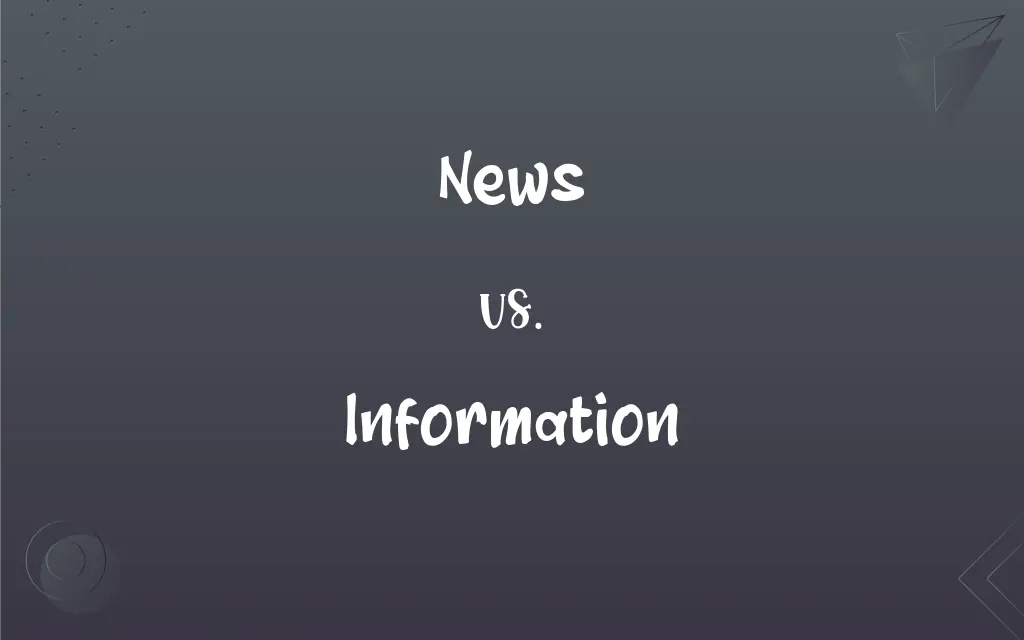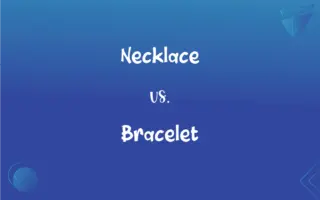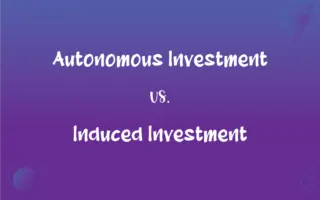News vs. Information: What's the Difference?
Edited by Harlon Moss || By Janet White || Published on December 3, 2023
News is timely reporting of events, while information is data or facts regardless of time relevance.

Key Differences
News primarily refers to current events or recent developments reported through various media channels. Information, on the other hand, encompasses a broader range of data, facts, or knowledge, which may or may not be related to current events. News is a subset of information, specifically tailored to recent and relevant occurrences.
The purpose of news is to inform, educate, and sometimes entertain the public about recent events. Information, in contrast, serves a wider purpose: it educates, provides insight, or assists in decision-making, irrespective of its timeliness. News is often a source of information but not all information qualifies as news.
News is often characterized by its immediacy and relevance to current affairs, making it ephemeral in nature. Information, however, has a more enduring quality, retaining its value over time, and can pertain to a variety of subjects, not limited to current events.
The dissemination of news is typically through newspapers, television, radio, and online platforms, focusing on delivering it as swiftly as possible. Information dissemination, however, is more diverse, including books, academic journals, databases, and the internet, emphasizing accuracy and depth over immediacy.
News is often subject to journalistic standards, requiring objectivity, accuracy, and fairness. Information, while also often held to standards of accuracy, can be more subjective, including opinions, analysis, and interpretation across various fields.
ADVERTISEMENT
Comparison Chart
Definition
Timely reporting of current events
Data, facts, or knowledge
Time Relevance
Highly time-sensitive
Not necessarily time-bound
Purpose
Inform about recent developments
Educate or provide insight
Dissemination Channels
Media outlets (TV, newspapers, online)
Various sources (books, internet, journals)
Nature
Often ephemeral and immediate
More enduring and diverse
ADVERTISEMENT
News and Information Definitions
News
News encompasses recent developments in politics, society, or technology.
Today's news highlights the launch of a new electric vehicle model.
Information
Information is knowledge obtained from study, experience, or instruction.
The brochure provided useful information about the city's history.
News
News is current information about events happening worldwide.
The news reported a major breakthrough in climate change negotiations.
Information
Information is processed data that provides meaning or context.
The information in the report helped solve the mystery.
News
News refers to the dissemination of information about recent occurrences.
The evening news covered the story of the local election results.
Information
Information is the collection of facts and data about a specific topic.
The library is an excellent source of information on this topic.
News
News includes reports on situations or events that have just happened.
Breaking news: a peace treaty was just signed in the troubled region.
Information
Information includes data communicated or received concerning a particular fact.
He received information about the road closures due to the parade.
News
News is the broadcasting or publishing of current and relevant happenings.
I heard on the news that the stock market hit a record high today.
Information
Information refers to facts or details about a particular subject or event.
She gathered all the necessary information for her presentation.
News
New information of interest.
Is there any news about the storm?
That was not much news in the press release.
Information
Knowledge or facts learned, especially about a certain subject or event.
Information
The act of informing or the condition of being informed; communication of knowledge
Safety instructions are provided for the information of our passengers.
FAQs
What is the main purpose of news?
To inform the public about recent and relevant happenings.
Is all information considered news?
No, only timely and relevant data about current events are considered news.
How does information differ from news in terms of content?
Information covers a broader range, while news is specific to current events.
What defines news?
News is current, timely reporting of events or developments.
What are common sources of information?
Books, academic journals, databases, and the internet.
Is timeliness a crucial factor in news?
Yes, timeliness is key to defining news.
Can news be a source of information?
Yes, news can provide information specifically about recent events.
Can information be outdated?
Yes, but it often retains value over time, unlike news which is time-sensitive.
Does news always contain factual information?
Ideally, yes, but it can sometimes include errors or bias.
How is news typically presented?
Through media like news broadcasts, articles, or online posts.
Can news become outdated?
Yes, as it is tied to current events, it can quickly become outdated.
Is information limited to current topics?
No, it spans a wide array of subjects, both current and historical.
Is the accuracy equally important in news and information?
Yes, but the emphasis on immediacy in news can sometimes compromise accuracy.
What are common sources of news?
Newspapers, TV, radio, and online media.
Can information be non-factual?
Yes, it can include theories, opinions, or speculative data.
Do news and information serve the same purpose?
Not exactly, news informs about current events, while information has broader purposes.
Can anyone generate news?
Technically yes, but credible news usually comes from recognized media outlets.
How is information typically presented?
In various formats like books, reports, articles, or databases.
Can information be subjective?
Yes, it can include opinions, interpretations, or analysis.
What makes news reliable?
Adherence to journalistic standards of objectivity and accuracy.
About Author
Written by
Janet WhiteJanet White has been an esteemed writer and blogger for Difference Wiki. Holding a Master's degree in Science and Medical Journalism from the prestigious Boston University, she has consistently demonstrated her expertise and passion for her field. When she's not immersed in her work, Janet relishes her time exercising, delving into a good book, and cherishing moments with friends and family.
Edited by
Harlon MossHarlon is a seasoned quality moderator and accomplished content writer for Difference Wiki. An alumnus of the prestigious University of California, he earned his degree in Computer Science. Leveraging his academic background, Harlon brings a meticulous and informed perspective to his work, ensuring content accuracy and excellence.








































































